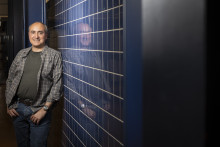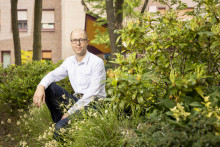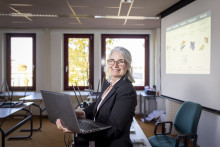Every lecturer has walked their own path to end up where they are now. One might go the traditional route, while another makes a remarkable career move that changes their life forever. Marcus Pereira Pessôa (52) undoubtedly belongs to the latter category. For about thirty years, he worked for the Força Aérea Brasileira, the Brazilian air force. Pereira Pessôa, who now works as a lecturer in the ET department Design , Production and Management, joined the air force when he was just fourteen. Given that Brazilian law at the time stipulated that anyone was entitled to retire after thirty years of service in the armed forces, Pereira Pessôa was looking forward to doing just that at the young age of forty-four.
Airborne acrobat
His work in Brazil mainly consisted of delivering medication to inhospitable areas or picking up sick people. He operated Cargos and trainers, two types of small aircraft. He preferred the latter, because it allowed him to - as he puts it - ‘be an acrobat in the skies.’ He also operated special aircraft that monitor whether all equipment at the airport functions during take-off and landing. When Pessôa wasn't flying, he was on the ground conducting research into ways to improve the technology that powered the air force's defence systems.

After his career in the armed forces, the Brazilian obtained a postgraduate degree from the prestigious Massachusetts Institute of Technology (MIT) before coming to Twente in 2016. He says this region is ‘perfect.’ These days, he only visits Brazil as a tourist and only takes to the skies as a passenger. His framed military awards have been given a place of honour in his office. He views his former career as a bunch of memories that he can look back on with fondness, even though he has embarked on a new chapter of his life.
Modest
On campus, Pereira Pessôa teaches master's students. In May of 2020, he received a Comenius Teaching Fellow grant worth €50,000 for his work related to the phenomenon of ‘just-in-time learning.’ By making information freely available, students can decide for themselves when to use specific knowledge. He recently received a nomination as a finalist for the Centrale Onderwijsprijs (Central Education Award). It said that he was ‘appreciated for his modest, kind and hard-working personality.’ Winking, he says that he does not recognise himself in that description. After all, saying he did would not be particularly modest of him. Nevertheless, Pereira Pessôa appreciated the nomination, because it serves as a clear signal that his customers are satisfied. He does not feel bad about not winning the prize; being nominated was enough of a victory for him.
The lecturer, who now lives in Enschede, believes a good lecturer should update their lessons every year. If they teach students the same things this year as they did last year, they are teaching them about the past. Revisions have to be made, if only because it would be boring to have the same discussions year after year. He also appreciates it when a lecturer strives to be a mentor rather than a teacher. It is about being close, admitting it when a student knows something that they don't and challenging each other.
Pereira Pessôa believes a lecturer should adapt to changing methods. He cites the dawn of the internet as an example. You can always find more information about a topic online than you can ever know as a lecturer - no matter how good or experienced you may be. As a teacher of master's students, he says, all you have is more experience under your belt. That is why he prefers to learn alongside his students and appreciates it when they do not agree with him.
Rank
He says his way of interacting with his students - with modesty and as their equal, instead of their superior - harkens back to his career in Brazil. As a flight instructor, he says, you can be a lieutenant, a captain or a general, but your rank has zero practical impact on your teaching. Although you respect the rank, it is all relative when it comes to knowledge.
That is not the only lesson that Pereira Pessôa the lecturer learned from Pereira Pessôa the pilot. When he had to take his test as a novice pilot, he learned first-hand that it is good to allow students to make mistakes. The instructor placed a hand on his shoulder and told him not to be nervous, because he would be allowed to make one mistake after another - just as long as he mastered everything by the time they were done. All the time the instructor and he had together was time for learning.
The Caribbean Netherlands
Despite his young age, he retired eight years ago. Although Pereira Pessôa does not have to keep working, he is not thinking about quitting just yet. As long as he continues to enjoy his life on campus, he will stick around. He likes to surround himself with smart people, he has noticed that his daughter is more Dutch than Brazilian now and he likes the pace at which people in Twente live their lives - striking the right balance between their families and their careers. Besides, after travelling so much all his life, nowhere truly feels like home for him anyway. ‘There are really only two things I miss here: the beach and the sun. Who know? I might leave for the Caribbean Netherlands one day.’






